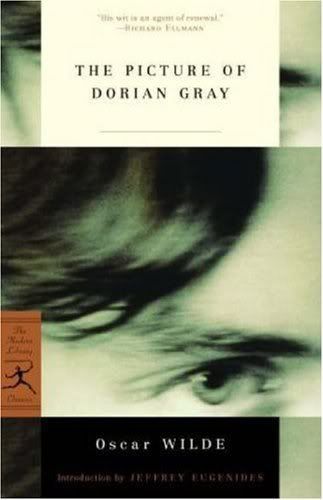Wilde, Oscar: The Picture of Dorian Gray

The Picture of Dorian Gray
Writer: Oscar Wilde
Genre: Fiction/Literature
Pages: 254
Let's see, so far, I'm reading a classic once a year since 2005! Maybe I should try to up that number a notch, eh?
The Picture of Dorian Gray is a book I've wanted to read for a while. No particular reason, other than I knew it was a classic and other people seemed to sing its praises. And there is quite a bit to sing about, and some to yawn about.
In the introduction by Jeffrey Eugenides, it's mentioned that the most colorful character of the book is not Dorian, but rather his friend (and I say, devil-in-disguise) Lord Henry Wotton. This is the character that picks apart his current society, and does so with pure devilish charm. The conservatives of the book love him, and some love to hate him, but Wotton is always a source of entertainment, as well as interesting insight. It is his character that seeds destruction in Dorian's character.
Dorian, it should be noted, is one of the few characters I've read that've expressed a huge range of human existence. There's the pure innocence of soul (and we see this when he's seventeen) to the pure wallowing in sin. We see him guilty, repentant, mad, hopelessly in love, and so much more. And what makes Dorian interesting--though not on the same level as Wotton--is the correlation between his life and the aging of his portrait. It is a fabulous symbol, one that sparks my imagination and ties the end together so well that I sat there for a moment marveling its genius. And I mean that: the end is perfect. I'm not going to spoil anything for anyone, save that few books tie together the symbol and character and theme so well together. And what is the theme? I venture that at least one of them is that if a tiger can change his stripes, they'll change for the worse, and he can't change them back. Truly, once innocence is lost, it can't be recaptured and made whole again. We can see it in others, experience it vicariously, but we can't get it back.
It's been said that Dorian Gray is one of the forerunners of modern horror (and those of you familiar with the genre, please feel free to elaborate or disagree in the comments, because we all know I'm somewhat clueless): if it's so, then it's definitely of the psychological kind. We see the making of a monster; we see the destruction of innocence; we see the tarnishing of soul. And that, really, is fascinating, especially as society often wonders how a man (or woman) can come to a state of mind where nothing is sacred, not even human life? The Picture of Dorian Gray is one answer; I'm sure there are many other books with others. The book has a Faustian theme as well, and one could easily make fun comparisons and analytical discussion over the various themes and similarities to those found in Doctor Faustus. Well, I could, and I haven't even read Doctor Faustus yet! But it's on the bookshelf: I'll get around to it eventually.
For those of you interested in reading, take note: there are some low spots, and unless you have a keen interest in said low-spots, they'll probably bore you. That's fine: skim through, get what you can, and enjoy the meatier parts: especially those with Lord Henry Wotton, because there's much to be considered in his tirades. And the end: oh, the ending. It's on the list of my favorite endings ever, and that's a very short list.